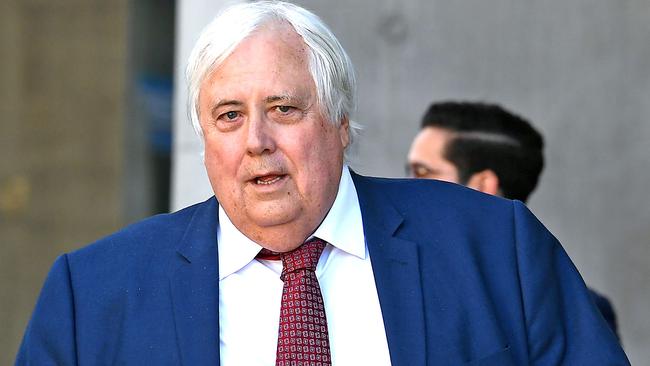Finally, Clive Palmer to pay out $110m
Clive Palmer has agreed to pay $110m to creditors of his collapsed Queensland Nickel refinery.

Former federal MP Clive Palmer has caved to the demands of liquidators and agreed to pay $110 million to creditors of his collapsed Queensland Nickel refinery, after years of insisting he was not responsible.
The massive settlement means liquidators will drop civil claims that Mr Palmer acted as a shadow director and allowed the company to trade while insolvent.
But the Australian Securities & Investments Commission is separately investigating the collapse of Queensland Nickel to see if any criminal charges can be laid.
Mr Palmer’s court woes are not over, as another set of liquidators is still chasing his flagship company, Mineralogy, for millions in unpaid debts and preparing to grill the mining magnate in the witness box next week.
Yesterday’s $110m settlement includes repayment of $66m in taxpayer funds paid to sacked Queensland Nickel employees not paid their redundancy entitlements when the Townsville refinery collapsed in 2016, costing 800 workers their jobs.
The federal government stepped in to cover the employee entitlements under the Fair Entitlements Guarantee Scheme, and later appointed a special-purpose liquidator to claw back the cash.
The settlement is a remarkable turnaround for Mr Palmer, who has consistently denied responsibility for the debts, and as recently as last month insisted he had a moral obligation to not simply repay creditors without a fight.
After a three-year standoff, the massive settlement came four weeks into the scheduled nine-week trial in which liquidators were chasing more than $200m.
It follows weeks of negotiations between the warring parties, who reached an earlier settlement deal with major creditor Aurizon last week.
Mr Palmer’s desire to reach an agreement was fuelled by the last-minute loss due to illness of his key defence witness, former liquidator Peter Dinoris, who was set to testify that the nickel refinery was not trading while insolvent. Following a hearing yesterday in the Supreme Court in Brisbane, special-purpose liquidator Stephen Parbery of KPMG said the volume of evidence compelled Mr Palmer to agree to the settlement.
“The complexities of the legal issues facing Mr Palmer and his co-defendants, and the resistance from these parties to the recovery actions, caused lengthy delays to the commencement of the trial,” Mr Parbery said.
“With the full weight of the evidence being laid before the defendants ahead of the trial, settlement negotiations were initiated as the trial commenced.
“This settlement is in the best interests of creditors and provides for the full repayment of the commonwealth’s FEG debt, all other outstanding employee entitlements, and a full recovery for the majority of unsecured creditors.”
Mr Palmer issued a statement, claiming he had been “vindicated” by the settlement and the “witch hunt” against him was finally over.
“Today’s settlement confirms the actions against me were nothing more than a witch hunt designed to smear my good reputation,’’ he said.
“I had no option but to fight this battle to clear my name and to demonstrate to all Australians that serious action is needed to reform the insolvency industry, which just destroys and does not build enterprise and jobs.”
Mr Palmer said the terms of agreement stipulated neither he nor any of his companies would pay the tens of millions in fees incurred by the special-purpose liquidators and their legal team.
During the trial, the court heard Queensland Nickel was facing collapse in late 2015, prompting Mr Palmer to seek a relaxation on debts owed to creditors and to seek help from federal and state governments.
Rail freight operator Aurizon claimed to be owed more than $90m, but it is understood last week’s settlement was for about $20m, which covered only services rendered and not the loss of contracted future earnings.
In April, ASIC boss John Price told a parliamentary committee “all options are on the table”, including criminal charges, in relation to its investigation into Queensland Nickel.
ASIC is probing allegations that Mr Palmer used the alias “Terry Smith” to run the company as a shadow director, Queensland Nickel’s money was siphoned into the Palmer United Party, and alleged breaches of directors’ duties.
On the first day of the trial, Mr Palmer was bullish outside court, telling reporters that although he was flush with cash, he would not simply pay Queensland Nickel’s creditors without a fight.
“The question is whether they’re (the debts) properly incurred or not,” he said.


